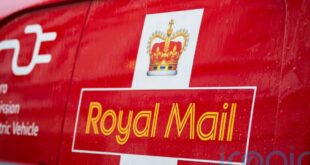Image copyright
EPA
All of the political parties this time round say they’d turn on the taps of public spending.
The Tories seem to have found the fabled magic money tree that Theresa May denied existed last time round. Labour has discovered a whole forest.
Boris Johnson would borrow a fair bit extra to improve the country’s infrastructure.
Labour would borrow a hefty chunk more and put taxes up on the wealthiest too – you can read more about their spending plans here.
And we’ll know more about the precise arithmetic of it all next week, when we expect the parties’ manifestos.
This election isn’t just about the difference in the size of the cheque book of the two potential governments, but about their whole approach to how the country and government does business.
And nowhere is that more obvious than with Labour’s plans to renationalise parts of the economy, and its newest plan for broadband that’s dominated the last 24 hours of the campaign.
John McDonnell, who makes absolutely no bones about the scale of what he would like to do, would take swathes of the economy into public hands – rail, water, energy utilities, the Royal Mail and now parts of BT too.
If he moves successfully into No 11 Downing Street and followed through with all of those plans, that would be an enormous expansion of the role of the state, reversing the trend of many years now that broadly governments do less, not more.
That’s not just the years of the squeeze on public services, after the deficit ballooned following the emergency of the financial crisis – but a consensus that developed after the radical, almost shock tactics of Margaret Thatcher, that broadly speaking, most politicians seemed to buy in to.
Running battles
The assumption has been that the private sector tends to be better at actually running things than the government, and that the state’s instinct should be to pull back, rather than spread its tentacles.
Jeremy Corbyn and John McDonnell were among the minority at Westminster that never accepted that.
And of course New Labour’s belief in the power of the private sector was the source of huge running battles in their party.
Since the financial crisis, plenty of politicians have dabbled around extra intervention, whether Ed Miliband, or even Theresa May.
The hangover from the crash, which required enormous state bailouts, pushed the pendulum back a bit towards government being a proactive force.
What John McDonnell and Jeremy Corbyn are proposing now however is not just a slight move in the margins, but government on a totally different scale.
It’s not just Brexit, the NHS, immigration, or the scale of public spending that’s part of the choice on the ballot paper here, but the very size and nature of the state.
Source link



